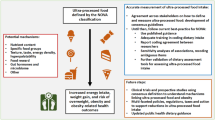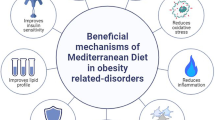Abstract
Purpose
Food susceptibility refers to an individual’s thoughts, feelings, and motivations when highly palatable foods are available. Mindfulness, or the practice of paying attention, non-judgmentally, in the present moment, is a key element in acceptance-based programs, which have been shown to benefit those with high food susceptibility. This study examined the relationship between food susceptibility and (1) trait mindfulness and (2) mindfulness facets (i.e., awareness, acceptance) in daily life.
Methods
Participants were 108 adults with overweight/obesity (45.56 ± 11.41 years old, 75.9% white, 72.2% female) enrolled in a weight loss trial (Clinical Trials.gov Identifier: NCT02786238). Food susceptibility was measured with the Power of Food Scale (PFS). Mindfulness was assessed using the Philadelphia Mindfulness Scale (PHMS) and its two subscales: PHMS-Awareness and PHMS-Acceptance. Two regressions examined the associations of (1) total PHMS on PFS, and (2) simultaneous PHMS subscales on PFS. Covariates were age, sex, race, and education.
Results
Regression results revealed, after adjustment for covariates, that Total PHMS was significantly negatively associated with PFS scores (β = − 0.258, p = 0.001), but only one of the PHMS subscales, Acceptance, was significantly associated with PFS scores (β = − 0.328, p < 0.001). PHMS-Awareness was not related to PFS scores.
Conclusion
Greater levels of mindfulness were associated with lower food susceptibility in treatment-seeking adults with overweight/obesity. Mindful acceptance may be the driving factor in this relationship, suggesting that awareness alone is not sufficient for promoting healthier appetite regulation. Interventions aimed to reduce food susceptibility and improve coping with cravings may benefit from an enhanced focus on teaching mindful-acceptance skills.
Level of evidence
Level III, observational cohort study.
Similar content being viewed by others
References
Lowe MR et al (2009) The Power of Food Scale. A new measure of the psychological influence of the food environment. Appetite 53(1):114–118. https://doi.org/10.1016/j.appet.2009.05.016
Lowe MR, Butryn ML (2007) Hedonic hunger: a new dimension of appetite? Physiol Behav 91(4):432–439. https://doi.org/10.1016/j.physbeh.2007.04.006
Howard LM et al (2020) Examining the ecological validity of the Power of Food Scale. Eat Weight Disord Stud Anorex Bulim Obes. https://doi.org/10.1007/s40519-020-00871-1
Rejeski WJ et al (2012) Power of food moderates food craving, perceived control, and brain networks following a short-term post-absorptive state in older adults. Appetite 58(3):806–813. https://doi.org/10.1016/j.appet.2012.01.025
Forman EM et al (2007) A comparison of acceptance-and control-based strategies for coping with food cravings: an analog study. Behav Res Ther 45(10):2372–2386. https://doi.org/10.1016/j.brat.2007.04.004
Forman EM, Butryn ML (2015) A new look at the science of weight control: how acceptance and commitment strategies can address the challenge of self-regulation. Appetite 84:171–180. https://doi.org/10.1016/j.appet.2014.10.004
Kabat-Zinn J (2015) Mindfulness. Mindfulness 6(6):1481–1483. https://doi.org/10.1007/s12671-015-0456-x
Lacaille J et al (2014) The effects of three mindfulness skills on chocolate cravings. Appetite 76:101–112. https://doi.org/10.1016/j.appet.2014.01.072
Tomlinson ER et al (2018) Dispositional mindfulness and psychological health: a systematic review. Mindfulness 9(1):23–43. https://doi.org/10.1007/s12671-017-0762-6
Lundwall C et al (2019) Self-regulation mechanisms explain how dispositional mindfulness promotes well-being. J Posit Sch Psychol 3(2):153–164
Hofmann SG et al (2010) The effect of mindfulness-based therapy on anxiety and depression: a meta-analytic review. J Consult Clin Psychol 78(2):169. https://doi.org/10.1037/a0018555
Rogers JM et al (2017) Mindfulness-based interventions for adults who are overweight or obese: a meta-analysis of physical and psychological health outcomes. Obes Rev 18(1):51–67. https://doi.org/10.1111/obr.12461
Ruffault A et al (2017) The effects of mindfulness training on weight-loss and health-related behaviours in adults with overweight and obesity: a systematic review and meta-analysis. Obes Res Clin Pract 11(5):90–111. https://doi.org/10.1016/j.orcp.2016.09.002
Fuentes Artiles R et al (2019) Mindful eating and common diet programs lower body weight similarly: systematic review and meta-analysis. Obes Rev 20(11):1619–1627. https://doi.org/10.1111/obr.12918
Warren JM, Smith N, Ashwell M (2017) A structured literature review on the role of mindfulness, mindful eating and intuitive eating in changing eating behaviours: effectiveness and associated potential mechanisms. Nutr Res Rev 30(2):272–283. https://doi.org/10.1017/S0954422417000154
Lattimore P (2020) Mindfulness-based emotional eating awareness training: taking the emotional out of eating. Eat Weight Disord Stud Anorex Bulim Obes 25(3):649–657. https://doi.org/10.1007/s40519-019-00667-y
Brewer JA et al (2018) Can mindfulness address maladaptive eating behaviors? Why traditional diet plans fail and how new mechanistic insights may lead to novel interventions. Front Psychol 9:1418. https://doi.org/10.3389/fpsyg.2018.01418
Forman EM et al (2013) Comparison of acceptance-based and standard cognitive-based coping strategies for craving sweets in overweight and obese women. Eat Behav 14(1):64–68. https://doi.org/10.1016/j.eatbeh.2012.10.016
Alberts HJ et al (2010) Coping with food cravings. Investigating the potential of a mindfulness-based intervention. Appetite 55(1):160–163. https://doi.org/10.1016/j.appet.2010.05.044
Hawkins MA et al (2018) Cognitive and Self-regulatory Mechanisms of Obesity Study (COSMOS): Study protocol for a randomized controlled weight loss trial examining change in biomarkers, cognition, and self-regulation across two behavioral treatments. Contemp Clin Trials 66:20–27. https://doi.org/10.1016/j.cct.2017.12.010
Cardaciotto L et al (2008) The assessment of present-moment awareness and acceptance: The Philadelphia Mindfulness Scale. Assessment 15(2):204–223. https://doi.org/10.1177/1073191107311467
Hayes SC (1994) Content, context, and the types of psychological acceptance. In Hayes SC, Jacobson NS, Follette VM, & Dougher MJ (eds), Acceptance and change: Content and context in psychotherapy Reno, NV: Context Press, pp 13–32
Wadden TA, Foster GD (2006) Weight and lifestyle inventory (WALI). Obesity 14(S3):99S-118S. https://doi.org/10.1038/oby.2006.289
Fisher N, Lattimore P, Malinowski P (2016) Attention with a mindful attitude attenuates subjective appetitive reactions and food intake following food-cue exposure. Appetite 99:10–16. https://doi.org/10.1016/j.appet.2015.12.009
Kristeller J, Wolever RQ, Sheets V (2014) Mindfulness-based eating awareness training (MB-EAT) for binge eating: a randomized clinical trial. Mindfulness 5(3):282–297. https://doi.org/10.1007/s12671-012-0179-1
Boutelle KN et al (2017) An open trial targeting food cue reactivity and satiety sensitivity in overweight and obese binge eaters. Cogn Behav Pract 24(3):363–373. https://doi.org/10.1016/j.cbpra.2016.08.003
Boutelle KN et al (2016) An open trial evaluating an attention bias modification program for overweight adults who binge eat. J Behav Ther Exp Psychiatry 52:138–146. https://doi.org/10.1016/j.jbtep.2016.04.005
Goldschmidt AB (2017) Are loss of control while eating and overeating valid constructs? A critical review of the literature. Obes Rev 18(4):412–449. https://doi.org/10.1111/obr.12491
Arndt J, Goldenberg JL (2004) From self-awareness to shame-proneness: evidence of causal sequence among women. Self Identity 3(1):27–37. https://doi.org/10.1080/13576500342000022
Kim S, Thibodeau R, Jorgensen RS (2011) Shame, guilt, and depressive symptoms: a meta-analytic review. Psychol Bull 137(1):68. https://doi.org/10.1037/a0021466
Blythin SP et al (2020) Experiences of shame and guilt in anorexia and bulimia nervosa: a systematic review. Psychol Psychother Theory Res Pract 93(1):134–159. https://doi.org/10.1111/papt.12198
Matlock KL, Turner RC, Gitchel WD (2018) A study of reverse-worded matched item pairs using the generalized partial credit and nominal response models. Educ Psychol Meas 78(1):103–127. https://doi.org/10.1177/0013164416670211
Baumgartner H, Steenkamp J-BE (2001) Response styles in marketing research: a cross-national investigation. J Mark Res 38(2):143–156. https://doi.org/10.1509/jmkr.38.2.143.18840
Greenberger E et al (2003) Item-wording and the dimensionality of the Rosenberg Self-Esteem Scale: do they matter? Personal Individ Differ 35(6):1241–1254. https://doi.org/10.1016/S0191-8869(02)00331-8
Klein R et al (2015) The Toronto and Philadelphia Mindfulness Scales: associations with satisfaction with life and health-related symptoms. Int J Psychol Psychol Ther 15(3):133–142
Cole KL, Turner RC, Gitchel WD (2019) A study of polytomous IRT methods and item wording directionality effects on perceived stress items. Personal Individ Differ 147:63–72. https://doi.org/10.1016/j.paid.2019.03.046
Conradt M et al (2008) Who copes well? Obesity-related coping and its associations with shame, guilt, and weight loss. J Clin Psychol 64(10):1129–1144. https://doi.org/10.1002/jclp.20501
Neumark-Sztainer D (2005) I’m, like, SO fat!: helping your teen make healthy choices about eating and exercise in a weight-obsessed world. Guilford Press
Hoek HW, Van Hoeken D (2003) Review of the prevalence and incidence of eating disorders. Int J Eat Disord 34(4):383–396. https://doi.org/10.1002/eat.10222
Funding
This project and manuscript were supported by the following funding sources: Keirns, National Heart, Lung, and Blood Institute (NHLBI; F31HL152620); Hawkins, National Institute of Diabetes and Digestive and Kidney Diseases (NIDDK; K23DK103941), Oklahoma Shared Clinical Translation Resources Center (OSCTR; U5GM104938); Hawkins and Ciciolla, Center for Integrated Research on Child Adversity (CIRCA; P20GM109097) funded by the National Institute of General Medical Sciences.
Author information
Authors and Affiliations
Corresponding author
Ethics declarations
Conflict of interest
The authors declare that they have no conflict of interest.
Availability of data and material
Data are not publicly available but interested parties may contact the corresponding author for inquiries.
Code availability
Not applicable.
Ethics approval
This study was performed in line with the principles of the Declaration of Helsinki. Approval was granted by the Oklahoma State University Institutional Review Board.
Consent to participate
Informed consent was obtained from all individual participants included in the study.
Consent for publication
Not applicable.
Additional information
Publisher's Note
Springer Nature remains neutral with regard to jurisdictional claims in published maps and institutional affiliations.
Supplementary Information
Below is the link to the electronic supplementary material.
Rights and permissions
About this article
Cite this article
Keirns, N.G., Stout, M.E., Smith, C.E. et al. Mindful acceptance, not awareness, associated with lower food susceptibility. Eat Weight Disord 27, 1481–1489 (2022). https://doi.org/10.1007/s40519-021-01288-0
Received:
Accepted:
Published:
Issue Date:
DOI: https://doi.org/10.1007/s40519-021-01288-0




